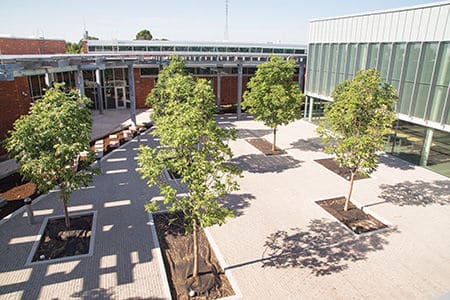Tarrant County College
5301 Campus Drive
Fort Worth 76119
www.tccd.edu/
Transparency takes new meaning at Tarrant County College’s newest educational resource.
Exposed ductwork and piping let passers-by know where hot and cold water flows, where climate-control infrastructure is located and other facets of the new Center of Excellence for Energy Technology on TCC’s South Campus.
“When you walk into the building, you start learning about it,” said Thomas Ford, acting dean of business and technology at South Campus. “Everything is exposed. Everything is labeled.”
And that’s by design.
While trendy restaurants and lofts often sport exposed ventilation ducts and pipes, more than décor is at work within the new building just east of Interstate 20 and south of Joe B. Rushing Road.
“It’s significant not only for the district, but also for Fort Worth and the North Texas region,” said Peter Jordan, South Campus president. “It will be an educational showplace and educational instructional tool.”
Its $42 million price tag ($33 million for construction alone) will be paid over three years. The renewable and replacement portion of the district’s operating budget is funding the facility.
Project architects, planners and educators celebrated the facility’s grand opening on Sept. 25. The 87,000-square-foot center allows the campus to expand its heating, air conditioning and refrigeration technology programs. But perhaps more important, it offers new curriculum rooted in geothermal technology, wind generation, solar, and oil and gas technology.
About 40 full-time faculty work in the center, South Campus’ first new building in 40 years. But its educational muscle reaches beyond those attending classes there.
“We’ll work with K-12 schools, charter schools and private schools to introduce young men and women to careers in energy fields,” said Jordan, who is equally committed to fostering relationships with private industry for ongoing education for working professionals.
The district’s partnership with NRG Energy was on display at grand opening ceremonies, where TCC students helped install an NRG Street Charge station, a 12-foot tower featuring solar powers allowing passers-by to recharge their mobile devices.
Forging partnerships with other area universities is another priority.
“We don’t have an agreement with [Texas Christian University], but will be exploring that, not only with TCU, but with other universities such as UT Arlington,” Jordan said. What such partnerships would entail has not been determined.
The school also hopes to gain more private industry partners for growing its curriculum.
“We are working with others not only to help us with our curricula in rigor and relevance, but also in terms of producing opportunities for our students and internships,” Jordan said.
While the facility offers expanded curriculum, it also provides more physical space for growing departments.
“It’s allowed us to move programs into a facility that has more room for expansion,” said Ford, whose computer-aided drafting and design classes still occupy the older buildings but enjoy more space since other classes moved into the new center.
Since joining the district nine years ago, Ford said, he has seen the need for such a facility to grow. Jeff Rector agrees.
“The new center provides a place for us to teach students in a different environment,” said Rector, building technology department chairman, who joined the district 19 years ago.
“The building is a 3D model, just like a pop-up book. All those [heating, ventilation and air conditioning] systems are peeled back and exposed,” Rector said.
When groundbreaking occurred on March 3, 2014, oil and natural gas drilling was ramping up in the Eagle Ford Shale, among other locations, making project architect Freese and Nichols Inc. and other planners believe that timing was right for such a facility.
Plunging oil prices since then have led more than a few energy firms to downsize, scale back operations or even call it a day. But energy education remains popular among students who are aware that such activities occur in cycles and that oil drilling likely will accelerate once again. They also acknowledge the growth of solar power, a resource that helps power the South Campus facility.
“This is our first architectural project [for TCC] where we’ve made use of solar panels,” said Allen McRee, architecture group manager and an associate with Freese and Nichols, a Fort Worth-based engineering and architectural firm.
Speaking with Fort Worth Business when construction began, McRee referred to a photovoltaic solar canopy shading the energy center’s courtyard bridging its two buildings.
The canopy performs two functions: reducing energy consumption and shielding students from scorching summer heat. Freese and Nichols has installed such technology in some Tarrant Regional Water District administrative buildings in north Fort Worth, but not for TCC until the Energy Technology Center.
Within the center, students learn in 10 classrooms, 18 labs and 6,200 square feet of so-called “sticky spaces” that encourage student interaction and learning.
Also part of the building will be a multipurpose hall able to accommodate up to 150 students.
The facility is designed to achieve LEED Gold designation, meeting standards set by the U.S. Green Building Council for Leadership in Energy and Environmental Design (LEED), with the ultimate goal to achieve LEED Platinum certification.
“It is a one-of-a-kind building. There is nothing like it in the country,” Rector said.






